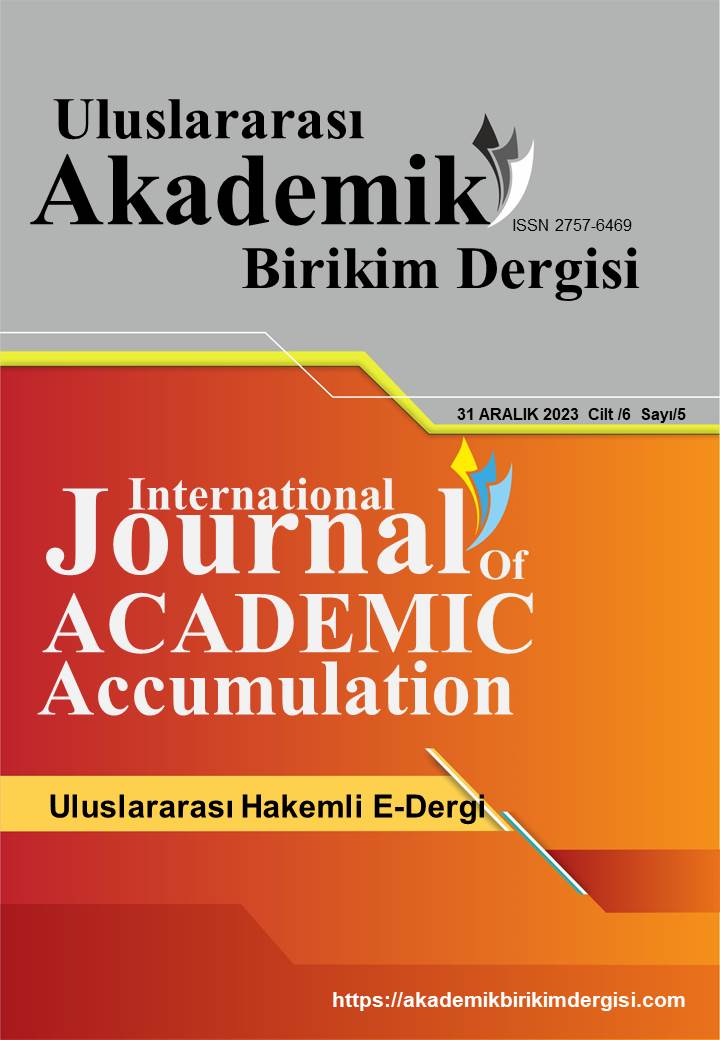The Effect of Dimensions of Emotional Intelligence on Social Skills and Child Depression
Keywords:
child depression, Emotional intelligence, social skills, psychology, school administrationAbstract
Children, who are our future, face with some problems both at school environment and in their social lives. These problems can cause children to experience stress to some extent. Social skill problems were observed in the presence of stress. Emotional intelligence is the best indicator of how children communicate with their environment and people in their surroundings. Examination of the interaction between the sub-dimensions of emotional intelligence, social skills, and child depression using multiple regression provides sufficient information about the basic features of the problem. In the research conducted for this purpose, "Matson Social Skills Assessment Inventory for Children" (1983) was used to measure the level of social skills, "Emotional Intelligence Scale for Children" developed by Küçükkaragöz and Kocabaş (2012) to determine the emotional intelligence levels of primary school students, and "Emotional Intelligence Scale for Children" to measure the depression levels of children. “Beck Depression Scale for Children” adapted by Öymen (1990) was used children depression. The analysis suggests that empathy, managing emotions, emotional awareness, and motivation subdimensions of emotional intelligence affect both the level of social skills and child depression. It has also been shown that if a child's behavior in the course of development is evaluated as positive and supported by some indirect or direct reinforcements, this will become its personality; thus, educational and administrative arrangements should be made at schools to support this process.
References
Akmal Rohaizad, N. A., Zaibon, S. B., Hussin, K.C. (2021). An analysis of preschool children emotional intelligence using RASCH model. Journal of Language & Linguistics Studies, 17(2), 1120–1128.
Beelmann, A., & Lösel, F. (2021). A Comprehensive Meta-Analysis of Randomized Evaluations of the Effect of Child Social Skills Training on Antisocial Development. Journal of Developmental and Life-Course Criminology, 7(1), 41.
Bernaras, E., Jaureguizar, J., and Garaigordobil, M. (2019). Child and Adolescent Depression: A Review of Theories, Evaluation Instruments, Prevention Programs, and Treatments. Front. Psychol. 10:543.
Cherniss, C. and Goleman, D. (2001). The Emotionally Intelligent Workplace: How to Select for, Measure, and Improve Emotional Intelligence in Individuals, Groups, and Organization, Jossey-Bass, San Francisco.
Chernobrovkin, V. A., Tupikina, D. V., Pavlyuchenko, E. A., Karlova, Yu. V., & Yakovleva, E. V. (2021). Use of works of art in the development of emotional intelligence preschool children. Perspektivy nauki i obrazovania – Perspectives of Science and Education, 52 (4), 327-342.
Cooper, R. K. and Sawaf, A. (1997). Executive EQ: Emotional Intelligence in Leadership and Organizations, New York, Grosset/Putnam.
Gardner, H. (1993). Multiple Intelligences: The Theory in Practice. Basicbooks, New York, USA.
Goleman, D. (2001). Emotional intelligence: perspectives on the theory of performance. In C. Cherniss & D. Goleman (eds.): The emotionally intelligent workplace. San Francisco: Jossey-bass.
Goleman, D. (2005). Why Emotional Intelligence Is More Important Than IQ? (Translated by B.S. Yüksel). İstanbul: Varlık Publications.
Kaplan, H., & Sadock, B (1988). Synopsis of psychiatry.
USA: William and Wilkins.
Kierstead, J. (1999) Human resource management trends and issues: Emotional intelligence (EI) in the workplace. Research Directorate, Policy Research and Communications Branch, Public Service Commission Branch, Public Service Commission of Canada. Available at: http://www.psc-cfp.gc.ca/research/personnel/ei_e.htm [Date of access:09.09.2020].
Küçükkaragöz, H. and Kocabaş, A. (2012). The validity and reliability of the emotional intelligence scale for Primary 5th Grade Students. 11th National Primary Teacher Education Symposium. 24-26 May 2012. Recep Tayyip Erdogan University, Rize.
Martin-Requejow, K., & Santiago-Ramajo, S. (2021). Reduced Emotional Intelligence in Children Aged 9-10 caused by the COVID-19 lockdown. Mind’s Brain and Education.
Mumcuoğlu, Ö. (2002). Turkish Linguistic Equivalence, Reliability and Validity Study of the Bar-On Emotional Intelligence Test. Unpublished Master's Thesis, Marmara University, Institute of Social Sciences, Istanbul.
Nique, S., Fournis, G., ElHage, W., Nabhan-Abou, N., Garr, J. B. and Gohier (2014). Transporteur de la sérotonine, troubles ansieux et dépression: revue de la littérature. Eur. Psychiatry 29, 544–545.
Orenes, A. M. (2015). Evaluación de la Ansiedad por Separación y Prevención Escolar de las Dificultades Emocionales [Evaluation of Separation Anxiety and School Prevention of Emotional Difficulties]. Doctoral dissertation, University of Murcia, Murcia.
Perry, M. A., Creavey, K., Arthur, E., Chance Humer, J., Lundgren, P. J., & Rivera, I. (2020). Cultivating emotional intelligence in child welfare professionals: a systematic scoping review. Child Abuse & Neglect 110(Part 3).
Racine N, McArthur BA, Cooke JE, Eirich R, Zhu J, Madigan S. (2021). Global Prevalence of Depressive and Anxiety Symptoms in Children and Adolescents During COVID-19: A Meta-analysis. JAMA Pediatr. Nov 1;175(11): 1142-1150.
Salavera, C.; Usán, P. (2021). Relationship Between Social Skills and Happiness: Gender Differences Int. J. Environ. Res. Public Health, 18, 7929.
Seker, M., Bayram, A. (2021). Kültürden İklime Okullar. Ed. Mustafa Çelikten, Ahmey Yıldırım, Kuram ve Uygulamada Eğitim Yönetimi, Eğitim Yayınevi, 45-65.
Seker, M., Rustamov, P., and Yalcin, F. (2013). The interaction between personality traits, emotional intelligence, and environmentally sensitive management: A study on central Anatolian companies. European Journal of Research on Education, 1-12.
Shapero, B. G., Black, S. K., Liu, R. Klugman J., Bender, et al.. E., Abramson, L. Y., et al. (2013). Stressful life events and depression symptoms: The effect of childhood emotional abuse on stress reactivity. J. Clin. Psychol. 70, 209–223.
Strauß, S., Bondü, R., & Roth, F. (2021). Justice sensitivity in middle childhood: Measurement and location in the temperament and social skills space. Journal of Personality Assessment 103(4), 476–488.
Vila, S., Gilar-Corbí, R., & Pozo-Rico, T. (2021). Effects of student training on social skills and emotional intelligence on the behavior and coexistence of adolescents in the 21st century. International Journal of Environmental Research and Public Health 18(10).
Wolter, I., Braun, E. and Hannover, B. (2015). Readingisforgirls!? The negative impact of preschool teachers’ traditional role attitudes on boys’ reading-related motivation and skills. Front. Psychol.6:1267.
Yalcin, I., Seker, M. Bayram. A. (2014). Research: The interaction between managers’ personality traits, emotional intelligence, and their use of management information systems. Int. J. Econ. Adm. Stud. 75–92.

